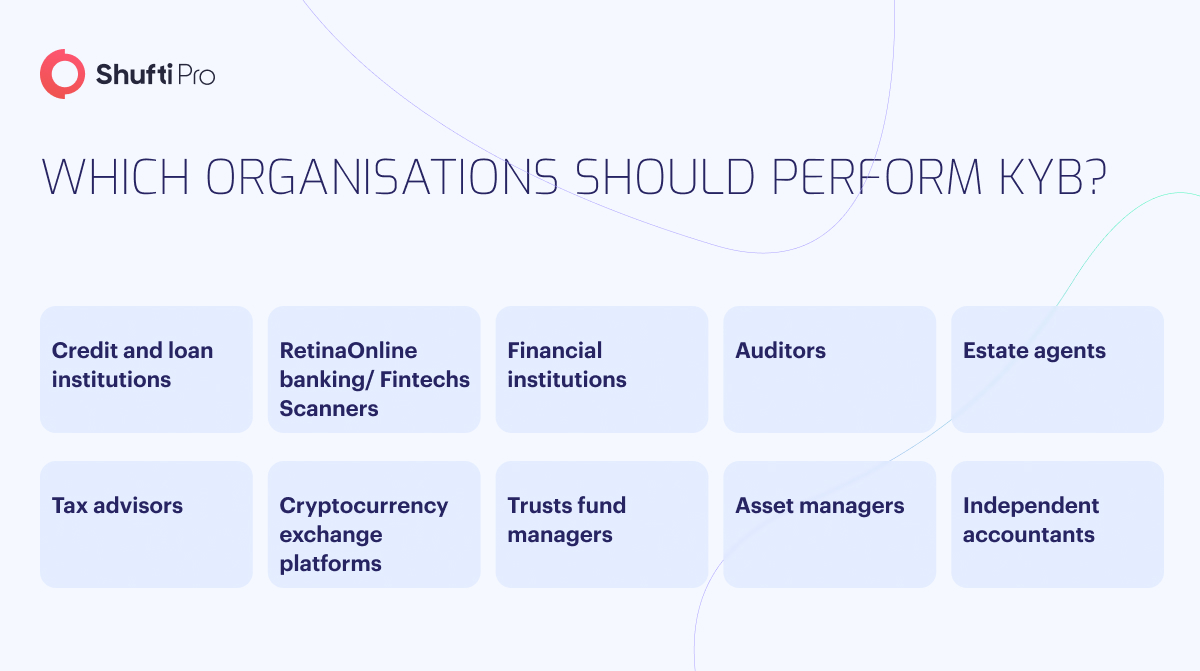The Advantages of Know Your Business (KYB)

Know Your Business (KYB) policies are a recent innovation in the field of fraud prevention. Since 2002, businesses have been safe from harm thanks to know your customer legislation, but there was a gap: corporate interactions weren’t subject to the same scrutiny as individuals. To fill the void and secure B2B operations, new Know Your Business laws under its customer due diligence requirements were introduced in 2016 by the US Financial Crimes Enforcement Network (FINCEN). Under the newly introduced regulation, any business that does business with another company must use a standardised process to ensure the latter is legitimate.
KYB is a verification standard that certifies a company’s legal status and compliance with Anti-Money Laundering (AML) rules as well as other regulatory requirements. According to the FinCEN, financial institutions and other businesses that must adhere to strict regulations will implement the Know Your Business (KYB) procedure to ensure they only work with legitimate entities.
Know Your Business Regulations
Know Your Business (KYB) is seen as an expansion of Know Your Customer (KYC) on a corporate scale. This is due to the fact that KYB is a somewhat newer legislation. Although Know Your Customer (KYC) guidelines have been in place for decades, businesses have recently been subjected to the same screening, allowing fraudsters to use enterprises to further their criminal purposes.
In 2017, European regulators released the Fourth Anti-Money Laundering (4 AML) Directive, specifically addressing KYB. Customer due diligence requirements for financial Institutions were last revised a year after the US FinCEN incorporated KYB regulations into the regulation.
Businesses that need to Comply with the KYB Regulations
The common misconception is that only the banking and financial sectors need to implement KYB procedures. However, that is not the case. Based on the 5th AML directive, companies operating in the following sectors are required to comply with the KYB:

The industries included here are extensive, and the list still continues. Even though it’s not required by law, organisations in the unregulated sector should still implement KYB checks to secure B2B operations. This is because it protects a business’s credibility and prevents dishonest individuals from misusing resources.
Know Your Business Checks
The laws and regulation requirements for KYB checks vary depending on the location. The general practice is to gather a vast amount of information on the concerned company. Shufti’s KYB verification checks collect the following information to validate the businesses:
- Basic Registration Information: Company Name, VAT, Registration Details, Legal Status, Share Capital, Legal Address, Website, Contact, Email Address, and Fax Number.
- Share Capital: Approved capital data that is either full or missing. The permitted capital, status (paid or unpaid), and inception date may all be included.
- Official Beneficiaries: Direct information from business registers on beneficiaries and Ultimate Beneficial Owners (UBOs).
- Calculated Beneficiaries: Calculation-based beneficiary information that can be traced back to the shareholders.
- Shareholding: Directors’ and shareholders’ (personal) ties with other firms’ stakeholders.
- Directorship: Connections between directors and shareholders, including information about the directors’ roles in other companies.
- Shareholders: Shareholders’ personal details, whether whole or missing. Name, registration number, date of birth, address or location, number and percentage of shares, as well as inception date, could all go here.
- Managers: Entire or partial details about all potential managers (including board members, supervisory board members, etc.). Managers’ job titles, full names, social security numbers, birth dates, places of birth, countries of residence, and hire dates are included here.
- Amount of Employees: Data from as recently as the last ten years must be included.
- Export/Import: Countries involved in export/import, last update date, months, and total export/import volume.
- Real Estate: A catalogue of buildings and other real estate that the corporation owns or leases.
- Movable Assets: An inventory of the company’s owned and leased automobiles.
- Subsidiaries: Details such as a subsidiary’s full name, address, registration number, share count, and percentage are required.
- Pledges: Date of beginning, pledge amount, pledgee’s name, country, registration code, and start date
- Litigations: Case details, including claimant and defendant identifiers, case number, outstanding debt, hearing date, and case status information, are essential to verify the businesses.
- Debts to Third Parties: Start dates, total, remaining, creditor, claimant, and paid-up.
- Tax Debts: Beginning balance, current balance, remaining balance, and payment status.
Financial institutions and regulated businesses frequently use public government registers and record keepers to get this information. Employees may need to show identification as proof that the organisation exists in different situations. Completing a KYB check verifies that the business the individuals are dealing with is legitimate and not a front for illegal activity.
Complying with KYB Rule
A company subject to KYB rules anywhere in the globe must typically assess the safety of its business contacts. Therefore, businesses need to have an adequate AML strategy, which includes the following steps:
- Business due diligence involves identifying the company’s ultimate beneficial owner (UBO) instead of customer due diligence, which consists of determining whether or not a customer is who they claim to be. A company’s riskiness can be gauged by calculating its UBO. Due diligence may need to be increased before moving forward with commercial connections or adopting continuing monitoring if UBO poses a higher risk.
- Businesses that fall under government oversight must do PEP (politically exposed person) screenings on business contacts. Companies that have been given the PEP designation are more likely to be involved in corrupt political practices, making them a riskier investment.
- It is important to monitor and abide by each country’s monetary limits on others. Businesses need to conduct background checks on staff. The constant motion provides instantaneous updates whenever the company’s reputation is attacked in the press. Keeping an eye on a company’s transaction history could reveal valuable details about the level of danger it faces. For instance, if many transactions go to countries with a high-risk rating, this could be a sign of money laundering.
The Advantages of Automating KYB Compliance
Verifying a business owner’s identity, investigating ownership structures, and finding beneficial owners can be time-consuming. Nonetheless, they must comply with Anti-Money Laundering (AML) legislation and Counter-Financing Terrorism (CFT) standards, which are increasing pressure on firms. This is when Know Your Business (KYB) automation comes in handy.
To help firms comply with AML requirements and safeguard themselves, automated KYB compliance uses Electronic Identity Verification (eIDV) to speed up the process. It facilitates electronic authentication to know your business requirements, streamlining the process and saving time.
Using data from state analyses, worldwide company records, PEP, and sanctions databases, automated KYB compliance examines ultimate beneficiaries and stockholders. Compliance is maintained through constant monitoring and automated controls. APIs allow businesses to access and verify information from government-maintained commercial registration databases. The digital KYB service can collect the necessary data with the business authorisation code.
An automated system for KYB compliance is more efficient and safer. The technology is intended to be more rapid, precise, and trustworthy, making business verification a breeze. Businesses can safeguard themselves from financial crimes and maintain compliance with applicable regulations by automating the KYB compliance procedure.
The Best Practices for Successful KYB Process
Adhering to industry standards is crucial for the success of your KYB procedure. For example:
Clear KYB Policies: Create a thorough Know Your Business (KYB) policy that details the organisation’s KYB strategy, including who is responsible for what, what data will be collected, and how risk will be evaluated. This policy should be reviewed and revised regularly to keep it current and valuable.
Risk-Based Approach: Apply a risk-based strategy to KYB by adjusting internal checks and balances to the risk level posed by each client, vendor, or business associate. This can help businesses to prioritise the threats to their company and devote resources where they will be beneficial.
Leverage Technology: Improve the efficiency of KYB procedures by implementing advanced technological solutions. Incorporating automation, AI, and ML technologies can help KYB initiatives be more precise, time and cost-efficient.
Monitor and Review: Businesses should check in on KYB procedures regularly to ensure they produce the desired results and achieve compliance and risk management goals. Among these activities is regularly auditing the system’s health and implementing any necessary remedial measures.
How Can Shufti Help
Shufti’s KYB verification services offer businesses a global advantage with universal coverage and instant insights. Shufti provides real-time risk protection by accessing verified business data from over 225 databases, such as complete information on UBOs and corporate profiles. It is a vital tool for companies negotiating the complexity of international transactions due to its easy onboarding process, smooth API integration, and rapid data access. Trust Shufti for reliable KYB solutions that empower businesses to make informed decisions, minimise risks, and expand confidently in the global market.
Ready to experience the benefits of Shufti’s universal KYB business verification? Contact us today to learn more about our services and how we can tailor them to suit your business needs.

 Explore Now
Explore Now













